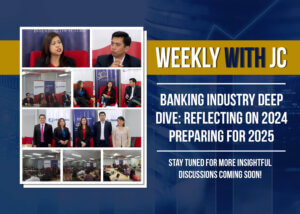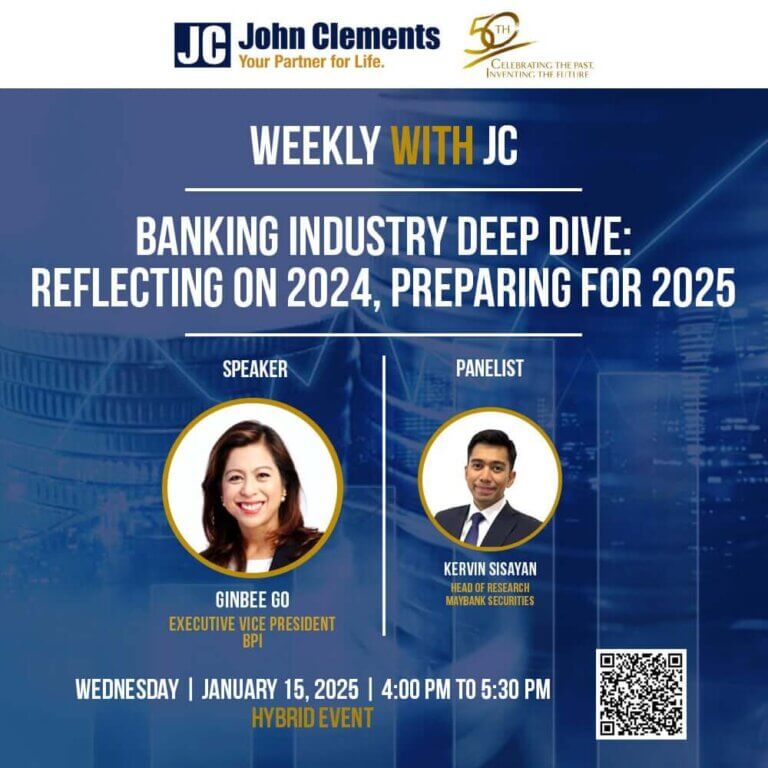Last Wednesday, January 15, 2025, the second installment of the Weekly with JC series featured a comprehensive discussion on the banking industry’s performance and outlook. The session was led by Ginbee Go, EVP of BPI, and Kervin Sisayan, Head of Research at Maybank, with Alicia Morales serving as moderator. Their insights explored the recovery trajectory, emerging trends, and strategic opportunities for the sector. Below are the key highlights from their engaging session.
Recovery and Challenges in the Banking Sector
The banking industry in the Philippines is undergoing a steady recovery, supported by lower inflation rates, GDP growth, and the anticipated depreciation of the peso. However, challenges such as geopolitical risks, fluctuating interest rates, and shifting consumer preferences necessitate strategic adaptation.
A significant driver of the country’s resilience is its reliance on domestic consumption, which constitutes 70% of the GDP. Improved consumer sentiment has led to increased spending, positioning the economy for stronger growth in 2025 compared to the previous year. This optimistic outlook, however, is tempered by uncertainties in global trade—particularly geopolitical developments—that could elevate global prices and prolong inflationary pressures.
The Digital Revolution in Banking
Digital transformation is reshaping the banking landscape. The rapid adoption of digital platforms, a surge in e-money accounts, and a significant shift toward digital transactions reflect evolving consumer needs. The speakers emphasized the importance of financial education and inclusion to ensure these innovations benefit a broader segment of the population.
Digital banking is no longer optional; it is a necessity for competitiveness. Enhanced security, streamlined processes, and improved accessibility are enabling banks to deliver exceptional customer experience. These advancements position the industry to better meet the demands of tech-savvy consumers.
Leveraging Technology and Sustainability
The integration of artificial intelligence (AI) and big data analytics is transforming banking operations. These tools enable better decision-making, personalized customer services, and improved risk management. Sustainability also remains a top priority, with banks committing to environmentally friendly practices and financing projects that drive sustainable development.
Digital branches are emerging as hybrid spaces, combining technology-driven convenience with personalized, in-person services. This approach enhances customer experiences and builds lasting trust—an essential factor in the competitive banking sector.
Strategic Moves and Economic Outlook
BPI’s EVP, Ginbee Go, highlighted the bank’s role in nation-building through its recent acquisition of Robinsons Bank. This move reflects BPI’s commitment to expanding its ecosystem and enhancing financial inclusivity. Such strategic initiatives underscore the bank’s dedication to addressing the evolving needs of Filipino consumers.
Economic insights from the discussion painted an optimistic picture for 2025. Lower inflation forecasts for FY25 and FY26, coupled with boosts in private consumption, are expected to sustain the country’s recovery. The speakers also highlighted opportunities for strengthening consumer loans to lift asset yields, particularly as non-performing loans (NPLs) remain low.
The Philippine peso (PHP) is projected to weaken further, driven by high U.S. Treasury rates. The currency is expected to reach 62 by Q2 of 2025 before stabilizing at 61 by year-end. While a weaker peso has contributed to a weaker Philippine Stock Exchange Index (PSEi), it presents opportunities for exporters and industries reliant on remittances.
The Bangko Sentral ng Pilipinas (BSP) is expected to adopt rate cuts, supported by a benign inflation outlook. This monetary policy adjustment aims to stimulate economic growth and offset potential external pressures, providing a more favorable environment for both consumers and businesses.
Sustaining Growth in 2025
Sustaining the recovery into 2025 will require a multi-faceted approach. Lower inflation, coupled with proactive monetary policies, will create a supportive backdrop for growth. A focus on consumer loans and digital banking innovations will further bolster the sector’s resilience.
Although uncertainties in global trade and inflationary risks remain challenges, the Philippines’ reliance on domestic consumption provides a buffer against external shocks. As consumer sentiment improves and spending increases, the country’s economic growth is expected to remain robust.
A Call to Action for the Banking Sector
Ginbee concluded the session with a quote from Charles Darwin: “If the misery of the poor be caused not by the laws of nature, but by our institutions, great is our sin.” Drawing on the concept of adaptability from Darwin’s theory of evolution, she urged the banking sector to embrace change that uplifts people’s lives. She inspired the audience to think beyond macroeconomic forces, monetary tools, and emerging technologies, calling on them to make a meaningful impact on society.

Ready to Navigate the Future of Digital Banking?
The banking industry is undergoing a rapid transformation, with digital banking playing a pivotal role in shaping its future. As we navigate 2025, strategic adaptation, technology integration, and sustainability will be key to staying competitive. John Clements is here to help your organization leverage these trends and stay ahead of the curve.
Explore our services and connect with us to learn how we can support your growth in the evolving banking sector. Contact us today!





